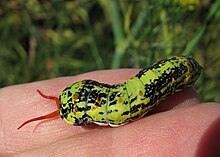repugnatorial
English[edit]

Papilio demodocus caterpillar everting its osmeterium to apply its repugnatorial secretion to the finger that has irritated it
Etymology[edit]
Adjective[edit]
repugnatorial (comparative more repugnatorial, superlative most repugnatorial)
- (zoology) Defensive or repulsive, particularly as applied to glands of certain invertebrates, with which they produce poisonous or repugnant secretions when under threat.
-
1909, Alpheus S. Packard, A Text-Book of Entomology, Macmillan, pages 372–373:
-
Certain beetles are endowed with eversible repugnatorial glands. Eleodes gigantea ... of both sexes ... when teased ... stand on their anterior and middle legs, holding the abdomen high up and spurting the contents of the glands right and left ... The liquid stains the human skin, has ... a peculiar, intensely penetrant odor, causing the eye to lachrymate.
-
-
1956, S. H. Skaife, African insect life:
-
If one of these caterpillars is irritated, it will bend back its head and shoot out a curious forked organ from the segment just behind the head. This osmeterium, as it is called, is yellow and is forced out by muscular action and by the pressure of the blood; at the same time a sickly over-powering odour of lemons is given off — the smell has also been likened to that of rotten pineapples...
Most of the cocktail ants are tree dwellers, making their nests under the bark, in hollow branches, or in carton nests attached to the branches. The carton nests are more or less spherical in shape, black, and they vary in size according to the size of the colonies. They are made of chewed vegetable fibres mixed with the secretion of the maxillary glands of the workers, which blackens the material and acts as a cement. The walls are thin and papery and the interior consists of irregular cells, like a coarse sponge. If the wall of one of these nests is broken open, the workers swarm out, with their tails in the air and their repugnatorial glands exposed..[1]
-
-
Usage notes[edit]
Almost the only natural usage is among zoologists as a technical term in describing particular classes of glands and their defensive secretions, either repellent or actually harmful; [invertebrate] animals such as certain insects produce most of the typical examples. However, secretions of other animals such as skunks also are described as repugnatorial.